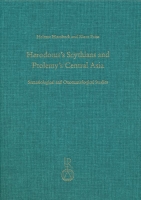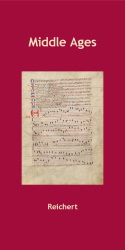Titelsuche
Herodotus’s Scythians and Ptolemy’s Central Asia
Semasiological and Onomasiological Studies
Kurze Beschreibung
The present book deals with semasiological and onomasiological questions in Herodotus's (5th century B.C.) famous portrayal of the Scythians and in Ptolemy's description of the Central Asiatic countries as presented in Book 6 of his 'Geography' (around 150 C.E.). The link is established by Ptolemy also mentioning Scythians.The main subject of the investigation is the philological examination, for the first time, of the numerous essentially geographical and ethnographical names, which allow a deeper insight into the religious rather than the political and cultural background of the time.
Ausführliche Beschreibung
This book covers semasiological and onomasiological studies on Herodotus and Ptolemy. In part A on Herodotus are first discussed the names of gods and persons collected in his famous portrayal of the Scythians of the northern Black Sea region, a well-known Iranian people, and secondly the Scythian tribes living on the northern border of Darius the Great's empire.The link between Herodotus and Ptolemy is established by the fact that Ptolemy also mentions Scythians, namely in his description of the Central Asiatic countries as in Book 6 of his 'Geography,' which dates from about 150 C.E. and so being ca. 600 years younger. The description of those countries tackled in part B is the main subject of the investigation.
For the first time in the long tradition of Ptolemy studies the numerous predominantly geographical and ethnographical names are examined philologically. They are of very different origins. Preserved in bad condition, they principally consist of epithets of deities allowing a deeper insight into the religious rather than the political and cultural background of the time.
The indexes C and D serve to better understand the meaning of the entries in part B.
Rezensionen
„A careful study offers many other similarly interesting cases.“Von Klaus Karttunen
In: Journal of the American Society, 134.4, (2014), 751-752.
--------------------------------------
„Die Gegebenheiten Zentralasiens zu verschieden Zeiten der Antike anhand semasiologischer sowie onomasiologischer zu untersuchen ist Ziel und Aufgabe der vorliegenden Schrift. Neben dem kaiserzeitlichen Ptolemaios wird zudem der Fokus auf den >klassischen< und für zahlreiche griechische Vorstellungen von der Welt außerhalb Griechenlands prägenden Herodot gelegt“
Von CF
In: Orbis Terraarum, 2012-2013, S.259-260.
Autoreninfo
Helmut Humbachborn in 1921, emeritus professor of Comparative (Indoeuropean) Linguistics at Johannes Gutenberg University Mainz (Germany), studied Indoeuropean and Classical Philology in Munich. In 1956 he was appointed to a chair at the University of the Saarland, in 1961 he accepted the chair at Mainz University. To the current formalism of linguistic prehistory, he preferred the philological and historical approach to texts of the past, which he consistently carried out in teaching and research. His expertise has been requested and welcome all over the world. The cooperation with his colleague Klaus Faiss enabled him to complete his life-long work on Zarathushtra but also that on Herodotus and Ptolemy.
Klaus Faiss
born in 1940, emeritus professor of English Philology at Johannes Gutenberg University Mainz (Germany), studied English and Romance Philology. After a three-year professorship at the Ruhr University Bochum, he accepted a chair at Mainz University in 1976 teaching English linguistics, both modern and historical, till 2006. His main fields of research are the history of the English language, especially morphology, word formation, and syntax as well as their interrelations. Owing to the collaboration with his highly estimated colleague Prof. Humbach, Klaus Faiss has developed a keen interest in Herodotus, Ptolemy, and Zarathushtra studies.




 Vorwort
Vorwort

 Neuerscheinungen 2023/2024
Neuerscheinungen 2023/2024
 Gesamtverzeichnis 2023/2024
Gesamtverzeichnis 2023/2024
 Katalog Oriental Studies & Linguistics
Katalog Oriental Studies & Linguistics
 Mittelalter
Mittelalter
 Deutsche Inschriften
Deutsche Inschriften
 Musiktherapie
Musiktherapie
 Literaturen im Kontext
Literaturen im Kontext